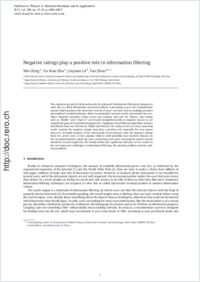Negative ratings play a positive role in information filtering
- Zeng, Wei Web Sciences Center, School of Computer Science and Engineering, University of Electronic Science and Technology of China, Chengdu, China
- Zhu, Yu-Xiao Web Sciences Center, School of Computer Science and Engineering, University of Electronic Science and Technology of China, Chengdu, China
- Lü, Linyuan Department of Physics, University of Fribourg, Switzerland
- Zhou, Tao Web Sciences Center, School of Computer Science and Engineering, University of Electronic Science and Technology of China, Chengdu, China - Department of Modern Physics, University of Science and Technology, Hefei Anhui, China
-
29.07.2011
Published in:
- Physica A: Statistical Mechanics and its Applications. - 2011, vol. 390, no. 23-24, p. 4486-4493
English
The explosive growth of information asks for advanced information filtering techniques to solve the so-called information overload problem. A promising way is the recommender system which analyzes the historical records of users’ activities and accordingly provides personalized recommendations. Most recommender systems can be represented by user-object bipartite networks where users can evaluate and vote for objects, and ratings such as “dislike” and “I hate it” are treated straightforwardly as negative factors or are completely ignored in traditional approaches. Applying a local diffusion algorithm on three benchmark data sets, MovieLens, Netflix and Amazon, our study arrives at a very surprising result, namely the negative ratings may play a positive role especially for very sparse data sets. In-depth analysis at the microscopic level indicates that the negative ratings from less active users to less popular objects could probably have positive impacts on the recommendations, while the ones connecting active users and popular objects mostly should be treated negatively. We finally outline the significant relevance of our results to the two long-term challenges in information filtering: the sparsity problem and the cold-start problem.
- Faculty
- Faculté des sciences et de médecine
- Department
- Département de Physique
- Language
-
- English
- Classification
- Physics
- License
-
License undefined
- Identifiers
-
- RERO DOC 27276
- DOI 10.1016/j.physa.2011.07.005
- Persistent URL
- https://folia.unifr.ch/unifr/documents/302103
Statistics
Document views: 127
File downloads:
- pdf: 218
